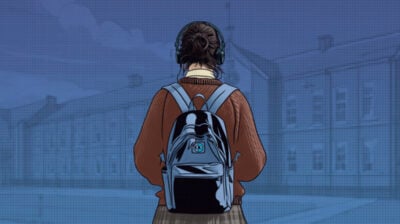Why noticing our body language is so important
Have you noticed someone is happy, angry or sad without them saying a word?

I wasn’t born with a poker face. In fact, when I did decide to finally arrive 2 weeks late, I came out screaming, as if to say “why the hell am I here?” Truth be told my little squashed face said it all, and unfortunately after 24 years, it still does. Ever hear the phrase “written all over your face?” Well this is a phrase that would follow me through every journey I would ever take.
Sometimes it was a blessing, but mostly it was a curse. I would arrive in the door from secondary school to be greeted by my mom. All it took was one look and she knew. Back then I didn’t realise I was communicating in a completely different language but as I got older, I realised that it was in fact my body which spoke louder than my words ever could. Depending on the situation I would be greeted with “what happened?”, “you got the part!”, or worst-case scenario, “well, who is he?”
After years of being easily read I decided to start a little project, a kind of “what you see is not what you get” type of project. So, I began to observe my facial expressions, eye movement, limb movement and other various postures and gestures I would make around certain people. What I discovered was astonishing.
Funny Feelings
I discovered that when words fail, our bodies truly speak. Have you ever walked into a room, an office or even a dressing room and instantly felt uncomfortable or unwanted? If you were to recall the same feeling to a friend later that day they wouldn’t have noticed anything? They ask questions like “but did anyone say anything mean to you?” or “did they ignore you?” The answer is always no, but simply because they didn’t have to. Their bodies said it for them. This feeling is unfortunately heightened for someone who is highly sensitive and they don’t just pick up on these signals, we actually start to feel them too. That eye roll you thought no one noticed, your slightly turned body language, or even your crossed arms. Yes, it is noted, and it is most definitely felt.
But you don’t just have to be highly sensitive to feel the wrath of a toxic atmosphere. For example, another “funny feeling” can come from when someone tells you “they are delighted for you” or “they are so proud of you” and yet every fibre of their body language is telling you quite the opposite. That smile that doesn’t go beyond their cheek and rests in their eyes or that icy embrace that makes you feel like you need to be thawed after. It’s like being told you’re pretty, but you could always be prettier at the same time.
Don’t get me wrong, we are all human. Maybe we really wanted the job that person just got, or we really liked that boy, or even we really wanted that last biscuit we said we didn’t. The fact that we didn’t get what we want does not mean we should allow the person to feel that void too. If anything, it should empower us to dig a little deeper for what we do want, because I’m sure when we finally do get that thing or person we have been dreaming of, that same person will be there to be “absolutely delighted for you”, and they will genuinely mean it (even if it’s about the biscuit).
Puppeteer
During this little project I watched countless TED Talks, read insightful articles entitled “body language for success” and even watched interactions between friends of mine who were just getting into new relationships themselves. The smallest things I found the most interesting. Like how my friends’ feet shifted towards her new romance as soon as he entered the room, or how suddenly her posture became bigger somehow. It was as if an invisible string conducted by a puppeteer had forced her arms open, uncrossed her legs, while simultaneously pulling her dimples high to meet him in order to form a smile. But there was no invisible string, just a different feeling and one that made her completely relaxed. When he left, I observed her arms cross once again, her ankles tuck into themselves and those dimples left to relax once again.
4th Language
I suppose what I’m trying to say is that we can all improve on what we are trying to convey to the world. Like any language, it takes practice and we aren’t going to be fluent overnight. The next time you are having a conversation with a friend or a stranger have a look at what you’re doing, what you’re saying or maybe what you’re not. Are you open towards them, are you nodding in agreement, are you smiling all the way up into your eyes? It could be the very difference in creating a genuine friendship, being promoted, getting a lead in a play, or just being more confident in general. And the next time someone asks you how many languages you speak, instead of the generic “English, Irish, German”, now tell them 4! Your future CV can thank me!
This article was written by a SpunOut.ie volunteer. Check out our volunteering opportunities here and get in touch if you’re interested in getting involved.






